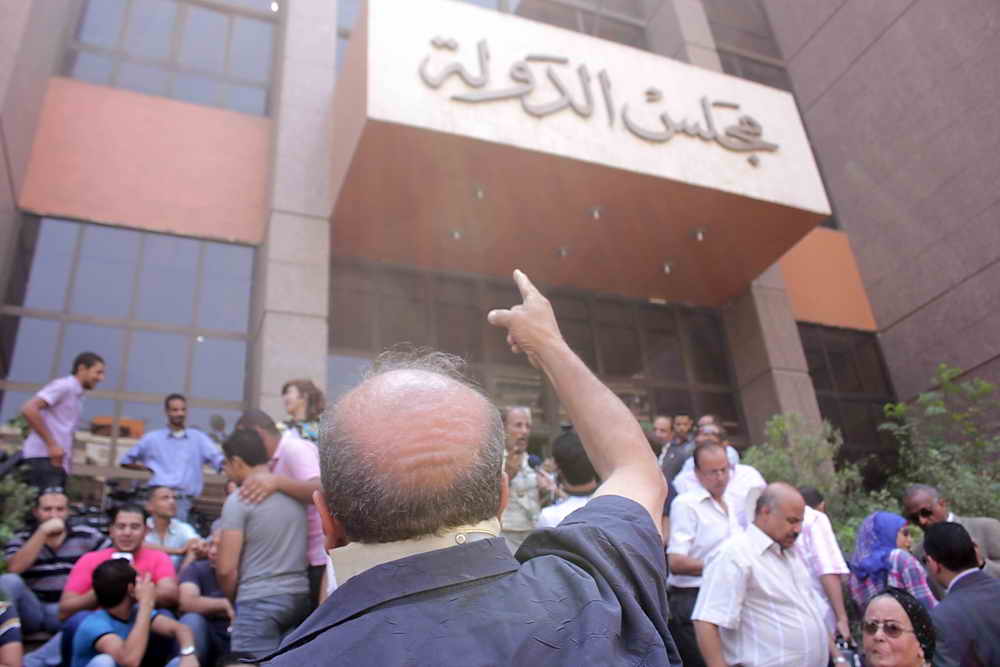
Earlier this afternoon, the Administrative Court postponed judgment on a recusal request made by Muslim Brotherhood lawyers in a case considering the dissolution of the Constituent Assembly. The postponement, which will now be heard on September 24, could significantly alter the trajectory of Egypt’s transition. After the first Assembly was dissolved in April, many thought the new Assembly would suffer a similar fate.
Now that the Assembly has been given another two months to write the Constitution, a draft could be ready by the end of August. The Assembly’s official spokesperson, Waheed Abdel Meguid, stated yesterday that the drafting would be completed within 20 days. To be sure, nothing is certain in Egypt: court dates shift frequently, executive decrees come and go, and elected bodies with revolutionary legitimacy have been summarily dismissed. Despite these developments, Egypt’s Constitution might be here to stay – but why?
Generally, the Assembly has been successful in building internal consensus. A few serious disagreements have caused some controversy (such as the rights of minorities, the future of Article 2, and the role of the military). But for the most part, the Assembly is weighing different constitutional options and reaching consensus without serious conflict. There is general agreement on the need to protect the judiciary, the balance of presidential and parliamentary powers, and the protection of rights and freedoms.
That being said, the Assembly is moving too quickly. The body has tried to be as transparent as possible through the use of expert hearings and meetings in various governorates, but decisions are more the product of institutional entrenchment than revolutionary innovation. That may be intentional. Members say the body can be dissolved at any time, and they stress the importance of finishing a document before a judicial body can muster the political backbone to dissolve the Assembly.
Similarly, the Assembly is not likely to deviate too much from the 1971 Constitution and the subsequent Constitutional Declaration – with the judiciary and SCAF likely allowing the Assembly to continue working as long as it continues to do so. Members have been wise to characterize the constitution not as an inventive break from the past, but as part and parcel of the Egyptian constitutional ethic. Shortly after the Assembly convened, for example, Members were given copies of the Constitutions of 1882, 1923, 1954, and 1971.
In the long run, this might still prevent Egypt’s massive, centralized bureaucracy from responding to citizen needs. There is still talk that governors and local councils will be appointed by executive decree (with a possible intermediary check by the Parliament). Interestingly, some Members are also weighing the benefits of a no-confidence clause that would allow Parliament to remove the Prime Minister and his government. It will be hard to justify the legitimacy of such a vote given the President’s authority to appoint these individuals.
So, what next? Article 60 of the Constitutional Declaration stipulates that, once a constitutional draft has been written, it must be put to a referendum within 15 days. But it’s not that simple: the SCAF’s mid-June amendments added another layer of control that might not be fought in the courts:
Article 60 (b1): If the president, the head of SCAF, the prime minister, the Supreme Council of the Judiciary or a fifth of the constituent assembly find that the new constitution contains an article or more which conflict with the revolution’s goals and its main principles or which conflict with any principle agreed upon in all of Egypt’s former constitutions, any of the aforementioned bodies may demand that the constituent assembly revises this specific article within 15 days. Should the constituent assembly object to revising the contentious article, the article will be referred to the High Constitutional Court (HCC) which will then be obliged to give its verdict within seven days. The HCC’s decision is final and will be published in the official gazette within three days from the date of issuance.
The amendment suggests that before a referendum is held, each of these institutions will have their say – and each will be able to delay the process well beyond the new September deadline. It seems unlikely that, if a draft is indeed ready, the SCAF or the judiciary will intervene. The longer a draft circulates, the more difficult it will be for each of these institutions to successfully challenge the document’s legitimacy.
It would appear as if today’s postponement is not just victory for the Constituent Assembly, but tacit recognition of SCAF approval.
Daniel Tavana is a consultant and political analyst interested in democratic governance and constitutional design in transitioning democracies. Currently based in Cairo, Daniel is a recent graduate of the Kennedy School of Government at Harvard University, where he worked at the Belfer Center and served as the founding Editor-in-Chief of the Harvard Journal of Middle Eastern Politics.
Photo Credit: The Daily News Egypt/ Mohamed Omar
Image: constituentassembly.jpg
